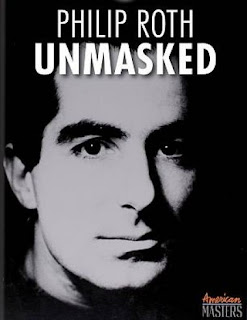Philip Roth Unmasked
Those who read this blog on a regular basis know that Philip Roth is my favorite writer--I've read almost all of his books, which is saying something. He has been pretty camera shy over the years, and his severe expressions in his author's photos have been pretty intimidating. Therefore, this film, which is airing on PBS as part of the American Masters series, is called "Unmasked," though Roth is not the recluse that it might suggest. He has given print interviews, and written op-ed pieces. He's no J.D. Salinger.
But, since I can't recall ever hearing Roth speak, this film was a revelation. Directed by William Karel and Livia Manera, the film almost entirely consists of Roth, plus a few admirers and friends, giving talking head interviews. There are also cliched shots of him walking along the beach, or at his Connecticut farmhouse, and a lot of photographs.
Those who don't care for Roth, or have no knowledge of him, probably won't have a strong level of interest, but it might be worthwhile in that Roth turns out to absolutely charming. He's very candid about his life, though some areas aren't broached, such as his second marriage to Claire Bloom. The only comment about his first marriage is that it was "brutal and lurid," an enticing statement that has no follow-up. But otherwise, Roth goes into great detail about his parents, his work (Portnoy's Complaint grew out of his funny stories told to friends), his writing habits (he writes standing up), and assorted anecdotes about encounters with the public.
There's been something of a Rothmania going on, as he turned 80 this month and a few months before announced his retirement from writing fiction (this is not mentioned in the film--perhaps he came to that conclusion after filming). There is a bus tour of important Roth spots in his home town of Newark, New Jersey. Inspired by Joyce and Faulkner, who wrote about the places they lived but never returned to, Roth wrote many books about the Weequahic, Newark, and has had various stand-ins for himself, most notably Nathan Zuckerman, who he put in nine books.
Why did the press-shy Roth agree to this film? Perhaps that can be summarized in the opening scene, when he announces that he faces two calamities: death and a biography, and that he hopes death came first. In this way he takes the bull by the horns, and rather than writing a memoir, this film will suffice as a sketch of his life and work.
But, since I can't recall ever hearing Roth speak, this film was a revelation. Directed by William Karel and Livia Manera, the film almost entirely consists of Roth, plus a few admirers and friends, giving talking head interviews. There are also cliched shots of him walking along the beach, or at his Connecticut farmhouse, and a lot of photographs.
Those who don't care for Roth, or have no knowledge of him, probably won't have a strong level of interest, but it might be worthwhile in that Roth turns out to absolutely charming. He's very candid about his life, though some areas aren't broached, such as his second marriage to Claire Bloom. The only comment about his first marriage is that it was "brutal and lurid," an enticing statement that has no follow-up. But otherwise, Roth goes into great detail about his parents, his work (Portnoy's Complaint grew out of his funny stories told to friends), his writing habits (he writes standing up), and assorted anecdotes about encounters with the public.
There's been something of a Rothmania going on, as he turned 80 this month and a few months before announced his retirement from writing fiction (this is not mentioned in the film--perhaps he came to that conclusion after filming). There is a bus tour of important Roth spots in his home town of Newark, New Jersey. Inspired by Joyce and Faulkner, who wrote about the places they lived but never returned to, Roth wrote many books about the Weequahic, Newark, and has had various stand-ins for himself, most notably Nathan Zuckerman, who he put in nine books.
Why did the press-shy Roth agree to this film? Perhaps that can be summarized in the opening scene, when he announces that he faces two calamities: death and a biography, and that he hopes death came first. In this way he takes the bull by the horns, and rather than writing a memoir, this film will suffice as a sketch of his life and work.



Comments
Post a Comment